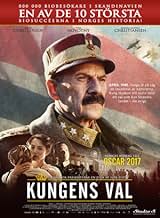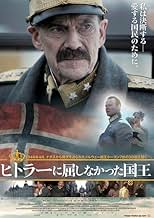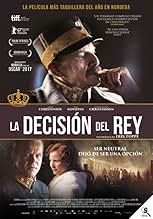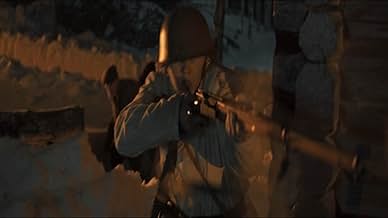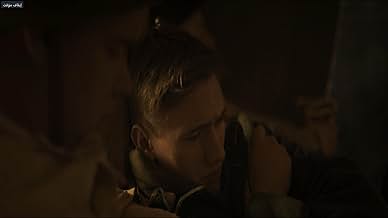IMDb-BEWERTUNG
7,1/10
10.693
IHRE BEWERTUNG
In der Nacht zum 9. April 1940 dringt die deutsche Kriegsschiffgruppe 5 unter Führung des Kreuzers "Blücher" in Norwegische Gewässer ein. Die Invasion Norwegens hat begonnen.In der Nacht zum 9. April 1940 dringt die deutsche Kriegsschiffgruppe 5 unter Führung des Kreuzers "Blücher" in Norwegische Gewässer ein. Die Invasion Norwegens hat begonnen.In der Nacht zum 9. April 1940 dringt die deutsche Kriegsschiffgruppe 5 unter Führung des Kreuzers "Blücher" in Norwegische Gewässer ein. Die Invasion Norwegens hat begonnen.
- Regie
- Drehbuch
- Hauptbesetzung
- Auszeichnungen
- 15 Gewinne & 9 Nominierungen insgesamt
Anders Baasmo
- H.K.H. Kronprins Olav
- (as Anders Baasmo Christiansen)
Empfohlene Bewertungen
I really liked it. I say it's a "niche" movie because I'm American. Were used to seeing films about the US and UK battles of WWII. This is a mostly quiet film, with modest action sequences. Most of it revolves around the intense pressure on King Haakon and his family. You can feel his anguish. The loving but strained relationship with the Crown Prince is depicted well. I recommend this film to anyone with interest in the first year of WWII.
My main feeling after seeing this movie, which covers the first few days of the second world war in Norway, is that I would like to see the movie continue all the way through the war.
While the performances are all great, and the locations used, the costumes, the recreations of Oslo and the soundtrack all contributed into making this an excellent movie - the highlight was how this story was told and the movie cut together. If you don't like inter titles, you won't like this movie. Every scene is introduced with location, date and time. And it works. I didn't always pay much attention to it, but the moments it chooses all feel like real moments in the story, the important highlights of actions performed by the people involved.
I do appreciate that they also spread their focus a bit wider than just the royal family. The German diplomat was an interesting character, trying his best to get a handle on a terrible situation, and doing a good (though futile) job. The young men on the front line are portrayed in a way that really shows the horrors of war on an ultimately inexperienced crowd. But the main story here is that of the royal family, who is made to seem more human than any other depiction I have seen of them, including most documentaries. They are not people born into a stoic calm, but rather people born into a job that at its worst can be really difficult and pressing.
The critique of this movie is mostly about what it is not: a new perspective. Again, you follow the heroes of the war, the people we shouldn't forget (and haven't forgotten). While I completely agree with the people wanting something new, this has little to do with this movie.
While the performances are all great, and the locations used, the costumes, the recreations of Oslo and the soundtrack all contributed into making this an excellent movie - the highlight was how this story was told and the movie cut together. If you don't like inter titles, you won't like this movie. Every scene is introduced with location, date and time. And it works. I didn't always pay much attention to it, but the moments it chooses all feel like real moments in the story, the important highlights of actions performed by the people involved.
I do appreciate that they also spread their focus a bit wider than just the royal family. The German diplomat was an interesting character, trying his best to get a handle on a terrible situation, and doing a good (though futile) job. The young men on the front line are portrayed in a way that really shows the horrors of war on an ultimately inexperienced crowd. But the main story here is that of the royal family, who is made to seem more human than any other depiction I have seen of them, including most documentaries. They are not people born into a stoic calm, but rather people born into a job that at its worst can be really difficult and pressing.
The critique of this movie is mostly about what it is not: a new perspective. Again, you follow the heroes of the war, the people we shouldn't forget (and haven't forgotten). While I completely agree with the people wanting something new, this has little to do with this movie.
With fine screen writing and heartfelt direction, Norwegian war drama "The King's Choice" (2016) is truly engaging and very well made.
The fifth feature film by director Erik Poppe and the fourth on which he co-operates with screenwriter Harald Rosenløw-Eeg (here assisted by screenwriter Jan Trygve Røyneland), "The King's Choice" boasts a grand performance by Danish actor Jesper Christensen and a beautiful score by Swedish Johan Söderqvist (one of the most important film composers in Scandinavia today).
The fifth feature film by director Erik Poppe and the fourth on which he co-operates with screenwriter Harald Rosenløw-Eeg (here assisted by screenwriter Jan Trygve Røyneland), "The King's Choice" boasts a grand performance by Danish actor Jesper Christensen and a beautiful score by Swedish Johan Söderqvist (one of the most important film composers in Scandinavia today).
"Kongens nei', a.k.a. "The King's choice", is a dramatic film that depicts how the Norwegian King Haakon VII (Jesper Christensen) decided the participation of Norway in the World War II immediately after the unexpected German invasion on 09 April 1940. This important historic event is unknown for most of the people around the world what makes this film unique. The screenplay follows the royal family from the eve of the German invasion until the moment they flee to outside the Norwegian border and seems to be very accurate. The great direction and performances associated to an excellent screenplay gives the sensation of a documentary. My vote is eight.
Title (Brazil): Not Available
Title (Brazil): Not Available
War history films look beyond battle to examine how things came to be. A fine example is the Norwegian bio-pic The King's Choice (2016). It tells the little-known story of the first three terrifying days when the Nazi war machine rolled into Norway and demanded that its ageing monarch surrender to the inevitable. Instead of the usual emphasis on military action, this film offers an extended essay on the moral responsibilities of leadership that is as relevant today as ever.
In April 1940, a fleet of German ships slips through Norwegian defences and issues an ultimatum: surrender or perish. Denmark had only recently capitulated to Germany but Norway's King Haakon VII (Jesper Christiansen) had no intention of following its example. Norway's traditional neutrality and antiquated military capacity made it seem defenceless, but it still managed to sink one warship which infuriated Hitler. A German envoy urged the King to accept a peaceful surrender and save Norwegian lives, but he refused to make it easy for the Nazis to take Norway. The Norwegian parliament was in disarray, nominally led by a Nazi-sympathiser with the surname Quisling, a word that universally has come to mean traitor. The nation was terrified and only the royal family was left as a symbol of hope and inspiration. Hitler was desperate to capture the family alive as a trophy for Nazi supremacy. The revered King and his heir apparent son fled to the countryside with Nazis in pursuit. Along the way, the envoy, his few remaining parliamentarians, and even his son, repeatedly urge the king to surrender. While Norway's collapse was inevitable, the royal family escaped to London where they led the Norwegian resistance for the remainder of the war.
There are several reasons why this film deserves praise. The most obvious is that it illuminates a piece of history that most people, except Norwegians, know very little about. It is a measured, sombre study of leadership with a competent cast, excellent cinematography, and detailed period sets and costumes. It provides a finely wrought portrait of a nation facing catastrophe using minimal dramatic embellishment yet with tension that rises over its long running time (two and a quarter hours). Jesper Christiansen plays King Haakon with regal authenticity as he goes from being a grandfather figure playing with children to a giant of integrity in the face of an extraordinary moral dilemma. The king's choice was his and his alone, and the film captures the enormous strain of knowing that Norway had no prospect of resisting the Nazi juggernaut yet believing that a nation's dignity should never be surrendered.
Despite its epic qualities there are some minor quibbles. Foreign language translations inevitably struggle with nuance and keeping up with dialogue is made more difficult when white sub-titles appear against white backgrounds, The film's pace would have benefited from more editing, less CGI and fewer scenes of the royal family in flight. But otherwise this is a gripping character-driven film that provides a fascinating glimpse into Norway's war history.
More reviews https://cinemusefilms.com
In April 1940, a fleet of German ships slips through Norwegian defences and issues an ultimatum: surrender or perish. Denmark had only recently capitulated to Germany but Norway's King Haakon VII (Jesper Christiansen) had no intention of following its example. Norway's traditional neutrality and antiquated military capacity made it seem defenceless, but it still managed to sink one warship which infuriated Hitler. A German envoy urged the King to accept a peaceful surrender and save Norwegian lives, but he refused to make it easy for the Nazis to take Norway. The Norwegian parliament was in disarray, nominally led by a Nazi-sympathiser with the surname Quisling, a word that universally has come to mean traitor. The nation was terrified and only the royal family was left as a symbol of hope and inspiration. Hitler was desperate to capture the family alive as a trophy for Nazi supremacy. The revered King and his heir apparent son fled to the countryside with Nazis in pursuit. Along the way, the envoy, his few remaining parliamentarians, and even his son, repeatedly urge the king to surrender. While Norway's collapse was inevitable, the royal family escaped to London where they led the Norwegian resistance for the remainder of the war.
There are several reasons why this film deserves praise. The most obvious is that it illuminates a piece of history that most people, except Norwegians, know very little about. It is a measured, sombre study of leadership with a competent cast, excellent cinematography, and detailed period sets and costumes. It provides a finely wrought portrait of a nation facing catastrophe using minimal dramatic embellishment yet with tension that rises over its long running time (two and a quarter hours). Jesper Christiansen plays King Haakon with regal authenticity as he goes from being a grandfather figure playing with children to a giant of integrity in the face of an extraordinary moral dilemma. The king's choice was his and his alone, and the film captures the enormous strain of knowing that Norway had no prospect of resisting the Nazi juggernaut yet believing that a nation's dignity should never be surrendered.
Despite its epic qualities there are some minor quibbles. Foreign language translations inevitably struggle with nuance and keeping up with dialogue is made more difficult when white sub-titles appear against white backgrounds, The film's pace would have benefited from more editing, less CGI and fewer scenes of the royal family in flight. But otherwise this is a gripping character-driven film that provides a fascinating glimpse into Norway's war history.
More reviews https://cinemusefilms.com
Wusstest du schon
- WissenswertesWilhelm Scream: When Seeberg shoots the German soldier at Midtskogen.
- PatzerThe real Battle of Drøbak Sound was much more involved than depicted, the other coastal defense batteries also joining in after the Oscarsborg Fortress had opened fire.
- Zitate
Menig Fredrik Seeberg: All for the King, Your Majesty.
H.M. Kong Haakon VII: No, Seeberg. All for Norway.
Top-Auswahl
Melde dich zum Bewerten an und greife auf die Watchlist für personalisierte Empfehlungen zu.
- How long is The King's Choice?Powered by Alexa
Details
- Erscheinungsdatum
- Herkunftsländer
- Offizielle Standorte
- Sprachen
- Auch bekannt als
- Das Nein des Königs
- Drehorte
- Produktionsfirmen
- Weitere beteiligte Unternehmen bei IMDbPro anzeigen
Box Office
- Bruttoertrag in den USA und Kanada
- 113.231 $
- Eröffnungswochenende in den USA und in Kanada
- 7.850 $
- 24. Sept. 2017
- Weltweiter Bruttoertrag
- 10.017.316 $
- Laufzeit
- 2 Std. 13 Min.(133 min)
- Seitenverhältnis
- 2.35 : 1
Zu dieser Seite beitragen
Bearbeitung vorschlagen oder fehlenden Inhalt hinzufügen



